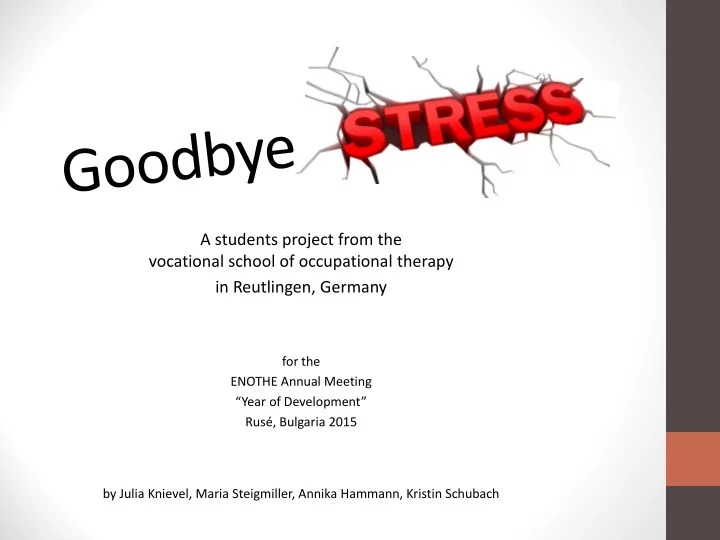

A students project from the vocational school of occupational therapy in Reutlingen, Germany for the ENOTHE Annual Meeting “Year of Development” Rusé, Bulgaria 2015 by Julia Knievel, Maria Steigmiller, Annika Hammann, Kristin Schubach
Questions related to stress • What is the definition of stress? • How can we encourage students to deal with the issue of stress? • How can occupational therapists intervene and do their part? 2
Ideas for a project people have stress has stress to deal with many is a daily stress at a consequences companion young age making students aware Goal of our school of the topic “stress” school project individual approach to stress relieve 3
Project facts In a mixture of group and individual work, students were asked to reflect on questions, participate in activities and talk about their stress experience. The collected input was structured and then discussed among the group. Place: Secondary School Reutlingen Period: 3 x 90 min on three different days Age of students: 13-15 years (grade 8) Number of students: 15 4
Exercise 1: Day 1 What is causing stress in your life? 12 students reported: • disputes • school, exams • family, daily life • dissatisfaction (with themselves) 3 students reported: • no stress exists 5
Exercise 2: Day 1 How does stress affect you? trembling (5) behavior sleeplessness (4) loss of appetite (3) bad temper/ aggression (1) insecurity (4) physical reaction headache (3) helplessness (1) restlessness/ impatience (1) nausea/ sickness (1) dissatisfaction (4) thoughts Troubled thoughts (3) thinking barriers (2) 6 grief (3) feelings racing heart (3) nervousness (1)
Exercise 3: Day 1 barometer of stress • I am stressed prior to an exam. • I am stressed when I have to do a presentation in front of the class. • I am stressed when I am missing class. • I am stressed when there is fighting at home. • I am stressed when I am fighting 7 with my friends.
Exercise 4: Day 1 stress prevention Friends and Family: having trustful relationships • talking to friends and family about problems • Sports: kickboxing • running • Leisure time, regeneration: sleeping • going outside • spending time in nature • being alone • Planning: study plan • to-do lists • 8 weekly schedule •
Day 1 Evaluation of Day 1 • Stress exists • Different physical and emotional symptoms • Students are open to talk about stress 9
Day 2 Most important causes of distraction: • interruptions by family or friends • electronic gadgets • inadequate space for studying • inattention 10
Day 2 Developing a daily schedule: • Input: story about a teenager • Discussion • Developing a personal daily schedule • Goal: to train a sense of time + structure a daily schedule 11
Day 2 Evaluation of Day 2 • Defining personal priorities & exchange experiences • Organize a daily routine & create an overview 12
Summary of the Evaluation Sheet Day 3 „Goodbye Stress“ Have you learned 10 something? 8 Were the topics 6 interesting? 4 Will you adopt ideas from the 2 project? 0 13
How do you evaluate the Day 3 whole project? not good very good okay good 14
Day 3 Summary Day 3 • Positive student rating • Students especially liked games, practical exercises and theoretical parts • Creation of a poster as a reminder of the content 15
Reflection on the project school • additional time for the project would have been useful • very good cooperation with school • school would gladly participate in further cooperation 16
Outlook & the role of occupational therapy • stress prevention & coping with stress to be adressed at schools • new field for German occupational therapists • Occupational therapist trained to look at daily life and the priorities of their clients 17
References Stangl, Werner (2006): http://entwicklungspsychologie.stangl.eu/stress.shtml (online on: 12.08.15, 14:45) Beyer, Anke (2006): Stressbewältigung im Jugendalter, Hogrefe Verlag, Göttingen 18
Less slides, less stress… Thank you for your attention! Any questions? 19
Recommend
More recommend